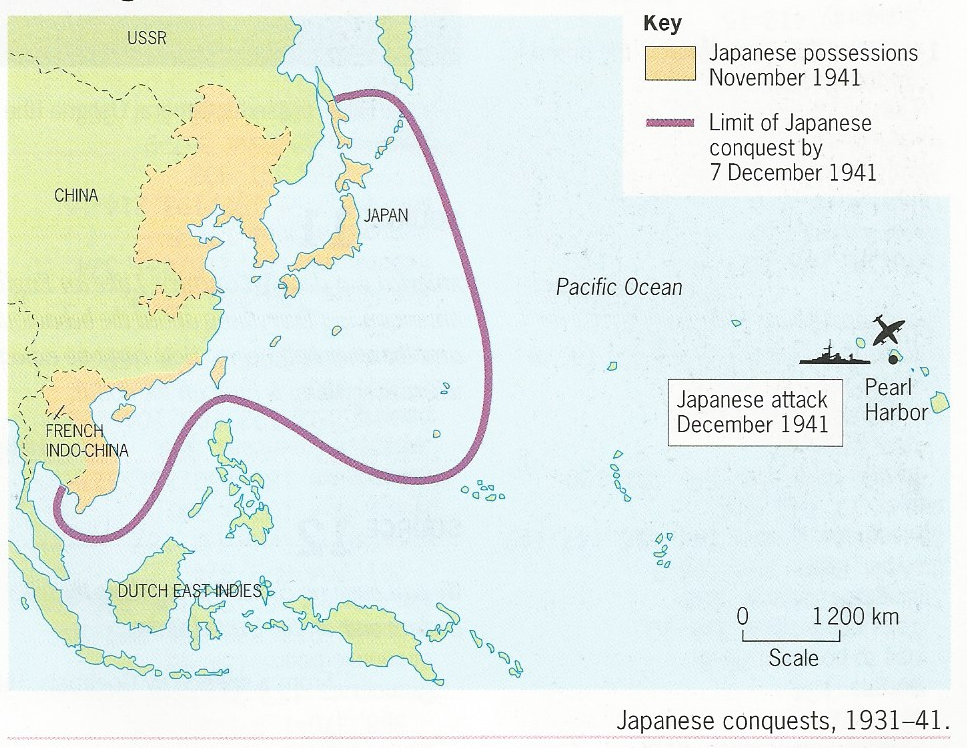Lesson 6 - The war becomes global - 1. Pearl Harbor
Japan - US rivalry
To some extent it might be argued that the Second World War actually began with Japan's invasion of China in 1937. As in the West, the Great Depression had resulted in the rise to power of a nationalist and militaristic government in Japan in the 1930s. The invasion of Manchuria in 1931 was merely the prelude to Japanese imperial ambitions in China and in south east Asia in General. (See map left)
Following the Japanese bombing of civilians in Shanghai during the early stages of the Second Sino-Japanese War in 1937 and the Nangjing Massacre (see case study in Year 11), many ordinary Americans were outraged. However, this outrage was not enough to shake the USA out of its isolationist stance. Beginning in 1935, the US government had passed a series of popular Neutrality Acts that were designed to ensure that the USA did not become involved in foreign conflicts, but Roosevelt had warned in his famous ‘quarantine speech’ in October 1937 (p.276) that the USA could not have 'complete protection' from the threat of war.
In September 1940, Germany, Italy and Japan signed the Tripartite Pact (also known as the Three-Power Pact or Berlin Pact). This pact signalled greater cooperation, especially with regard to defence, and promised assistance if one member country was attacked. The pact was signed partially to deter the USA from intervening in the growing conflicts in Europe and Asia. Japan seized the opportunity caused by France’s surrender to occupy northern Indochina (modern-day Laos, Cambodia and Vietnam). The USA responded by imposing sanctions and reducing exports of vital resources such as oil and iron to Japan. When the Japanese advanced further south in Indochina in July 1941, the USA announced a total ban on exports. Furthermore, all Japanese assets in the USA were frozen. Roosevelt made clear that the sanctions would not be lifted until Japan agreed a peace treaty with China. This development meant that, without retreating in Indochina and China, the only hope that Japan had of gaining the necessary resources to maintain its armed forces lay in the Philippines (a US possession), Malaya (a British colony) and the Dutch East Indies (a Dutch colony). Therefore, during the negotiations with the USA over the summer of 1941 to bring about an end to the sanctions, Japan planned coordinated attacks in South-East Asia with the planned assault on Pearl Harbor in Hawaii.
In September 1940, Germany, Italy and Japan signed the Tripartite Pact (also known as the Three-Power Pact or Berlin Pact). This pact signalled greater cooperation, especially with regard to defence, and promised assistance if one member country was attacked. The pact was signed partially to deter the USA from intervening in the growing conflicts in Europe and Asia. Japan seized the opportunity caused by France’s surrender to occupy northern Indochina (modern-day Laos, Cambodia and Vietnam). The USA responded by imposing sanctions and reducing exports of vital resources such as oil and iron to Japan. When the Japanese advanced further south in Indochina in July 1941, the USA announced a total ban on exports. Furthermore, all Japanese assets in the USA were frozen. Roosevelt made clear that the sanctions would not be lifted until Japan agreed a peace treaty with China. This development meant that, without retreating in Indochina and China, the only hope that Japan had of gaining the necessary resources to maintain its armed forces lay in the Philippines (a US possession), Malaya (a British colony) and the Dutch East Indies (a Dutch colony). Therefore, during the negotiations with the USA over the summer of 1941 to bring about an end to the sanctions, Japan planned coordinated attacks in South-East Asia with the planned assault on Pearl Harbor in Hawaii.
Pearl Harbor and the war in the Pacific
|
What was Japan hoping to achieve at Pearl Harbor?
The aim of the attacks on Pearl Harbor was to knock out the US Pacific Fleet in order to give the Japanese a free hand in South-East Asia. At 07:55 a.m. on 7 December, the first attack wave of 183 aircraft arrived at Pearl Harbor. A second wave of 170 aircraft was launched shortly afterwards. The attack on Pearl Harbor lasted only 90 minutes. During that time, 21 ships were destroyed or damaged, with nearly 2500 servicemen killed and just over 1000 injured. But crucially no aircraft carriers were destroyed. The formal Japanese declaration of war was not received by the US government until after the attacks on Pearl Harbor had ended. |
|
When Italy and Germany declared war on the USA on 11 December, the USA responded by declaring war on them. The attacks on Pearl Harbor, along with Operation Barbarossa (the German invasion of the Soviet Union which had begun on the 22 June 1941 - below), essentially transformed what was then a European war into a global one.
Activity 1 - From isolationism to war
Read the textbook pages 275-8.
Explain how and why American isolationist policy gradually changed in the lead up to Pearl Harbor.
Read the textbook pages 275-8.
Explain how and why American isolationist policy gradually changed in the lead up to Pearl Harbor.
|
|
Activity 2 - Did President Roosevelt let Pearl Harbor happen?
"I will go to my grave convinced that FDR ordered Pearl Harbor to let happen. He must have known." Vice Admiral Libby. This is one of the world's favourite conspiracy theories, but it also one that has engaged the attention of a number of serious historians. Watch the film opposite. You can also get plenty of more information from Wikipedia and Encyclopaedia Brittanica.
|

